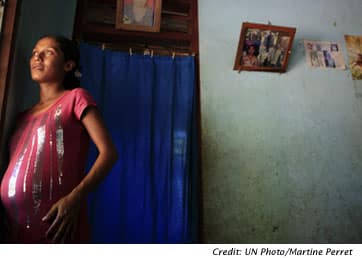
 TOKYO (WOMENSENEWS)–Pregnant women living in the vicinity of the Fukushima Dai-ichi nuclear power plant disaster are caught in the middle of conflicting evacuation advice.
TOKYO (WOMENSENEWS)–Pregnant women living in the vicinity of the Fukushima Dai-ichi nuclear power plant disaster are caught in the middle of conflicting evacuation advice.
While the government recommends that anyone living within about 19 miles of the plant leave the area and stay indoors, the International Atomic Energy Agency thinks people farther away are also at risk.
The agency finds that unsafe radiation levels have spread as far as places such as the city of Iitate, about 25 miles away from the Fukushima Dai-ichi plant.
"Japan exceeded its criteria and twice the amount of our standard for evacuation," said an the atomic agency spokesperson last week in Tokyo. "We have advised (Japan) to carefully assess the situation and they have indicated that it is already under assessment."
Greenpeace International, which sent observers to Fukushima prefecture in Japan to monitor radiation levels, is accusing Japanese authorities of intentionally downplaying risks and not issuing adequate health warnings.
"It was not safe for people to remain in Iitate, especially children and pregnant women, when it could mean receiving the maximum allowed annual dose of radiation in only a few days," said Jan van de Putte, a Greenpeace radiation safety analyst. "When further contamination from possible ingestion or inhalation of radioactive particles is factored in, the risks are even higher."
The United States recommends its citizens stay 50 miles away from the plant.
‘Evacuate a Baby’ Launched
Waseda Shotenkai, a nonprofit shop-owners advocacy group in Tokyo, has started a project called "Evacuate a Baby" to step in to the breach in evacuation policy. (Waseda is an area in Tokyo’s Shinjuku district.)
"Our group is taking responsibility for Japan’s future by saving mothers and their children and pregnant women," said Junichiro Yasui, a member of Waseda Shotenkai.
Keiya Konno, the group’s president, was killed along with his entire family when the tsunami destroyed his hometown of Minami Sanriku City in Miyagi prefecture. Waseda Shotenkai and its branch in Minami Sanriku worked together to export local goods to Tokyo. Yasui wanted to help the people where Konno came from and the organization’s members agreed that the task couldn’t be left to the government.
"They are too bureaucratic and still in a state of chaos and are not helping pregnant women enough, so we decided to do it," Yasui said. "The Japanese government supports us. For example, they give us permits that we need, such as for buses."
The group agrees with the atomic agency that the evacuation zone should be extended beyond the government’s suggested radius of between 12.5 miles and 19 miles.
Under normal circumstances, the group of more than 450 serves as a business booster by organizing and hosting commercial events. But since March 19 it’s been focusing on what it can do to move people from the affected areas, find a place for them to stay and provide them with proper nutrition, medical care and ongoing support.
The group had evacuated five families as of April 1. Since then electricity has been restored in some of the affected areas and Yasui thinks that will speed up demand for their services.
"We are starting to receive many phone calls asking for help," he said. He expects they will be evacuating hundreds of families.
New Moms Released Early
Women who have just delivered babies are included in the evacuation since the hospital released them early to make way for the people injured in the disaster.
The group made a deal with the city of Yuzawa in Nigata prefecture to provide rooms for the women, children and infants in a nationally famous ski and snowboarding resort. Nestled in the Japanese Alps, it is about 77 minutes by bullet train from Tokyo. The town is closed to tourists until further notice because of a lack of electricity and gas but Waseda Shotenkai’s evacuees will be allowed in.
Other nongovernment groups are working with Waseda Shotenkai and the government has also set up a special division to assist these groups.
Yasui says that besides the radiation levels, the situation in the refugee shelters in the Fukushima, Miyaki and Ibaraki prefectures is severe and getting worse every day, especially for pregnant women and children. More than 161,000 are in shelters, according to the National Police Agency.
There is not enough milk, hot water, diapers and other much-needed daily necessities. Some people are suffering from dehydration, malnutrition and infectious diseases, which are now beginning to spread. There is also stress and fatigue, particularly among mothers.
Chief Cabinet Secretary Yukio Edano said on Friday that the government does not plan to extend the evacuation zone beyond 12.5 miles. He said the government would monitor prolonged unsafe levels of radiation that would pose a health risk.
"We will continue to monitor the radiation in the air and make all preparations so that when the need arises, we will be able to deal with it without delay, which is where we are now," he said at a news conference.
The Fukushima plant has been leaking high levels of radiation since an earthquake and subsequent devastating tsunami stuck Japan on March 11. More than 27,973 are dead or missing and hundreds of thousands have been left homeless.
Would you like to Comment but not sure how? Visit our help page at https://womensenews.org/help-making-comments-womens-enews-stories.
Would you like to Send Along a Link of This Story?
https://womensenews.org/story/reproductive-health/110405/japans-pregnant-women-new-moms-get-mixed-signals
Catherine Makino is president of Majirox News. She has written for the San Francisco Chronicle, the Los Angeles Time, the Japan Times, The Asian Wall Street Journal and Inter Press Service.


